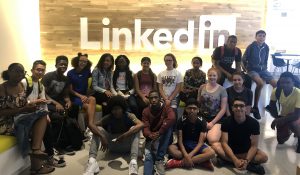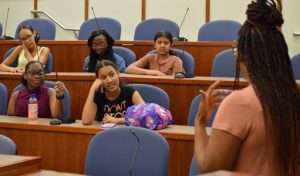Tag: augustin chaintreau
An Interdisciplinary Approach to Artificial Intelligence
They could have been at the beach enjoying the summer. Instead, high school students gathered from across New York City and New Jersey for the AI4All program hosted by the Columbia community. The students came to learn about artificial intelligence (AI) but this program had a special twist – computer science (CS) and social work concepts were combined for a deeper, more meaningful look at AI.
“We created a space for young people to think critically about the social implications of artificial intelligence for the communities that they live in,” said Desmond Patton, the program co-director and associate professor of the School of Social Work. “We wanted them to understand how things like race, power, privilege and oppression can be baked into algorithms and their adverse effects on communities.”

The program participants, composed of 9th, 10th and 11th graders, are from racial and ethnic groups underrepresented in AI: Black, Hispanic, and Asian. Girls as well as youth from lower-income backgrounds were particularly encouraged to apply. For three weeks the students attended lectures, went on field trips to visit local companies (LinkedIn and Samsung) involved in the program, and visited other AI4All programs, like at Princeton University. Their work culminated in a final project which they presented to their classmates, mentors, and industry professionals.
“I believe that it is important to bring more ethics to AI,” said Augustin Chaintreau, the program co-director and a CS assistant professor. He sees ethics integrated into technical concepts and taught at the same time. Instead of learning about the social consequences and fixing it after, to solve an issue. Shared Chaintreau, “It shouldn’t be thought about just in passing but as a central part of why this is a tool and its implications.”
An interdisciplinary approach to AI was even part of how the classes were structured. Technical CS concepts, such as machine learning and Python, were taught in the morning by professors and student volunteers. While in the afternoon, guest speakers came to talk about their perspective to the day’s lesson. So, on the same day, students learned about supervised and unsupervised learning, and in the afternoon, someone who was formerly incarcerated described how the criminal policing that survey people on social media had a role in making a case against them.

“We were learning college courses meant to be taught in a month but for us it was just a couple of weeks and that was really impressive,” said Genesis Lopez, who is part of the robotics team at her school. Lopez loves robotics but works more on the mechanical side. She goes back to the team knowing how to use Python and is confident she can step up and code if needed. Continued Lopez, “I learned a lot but my favorite part was the people, we became a family.”

